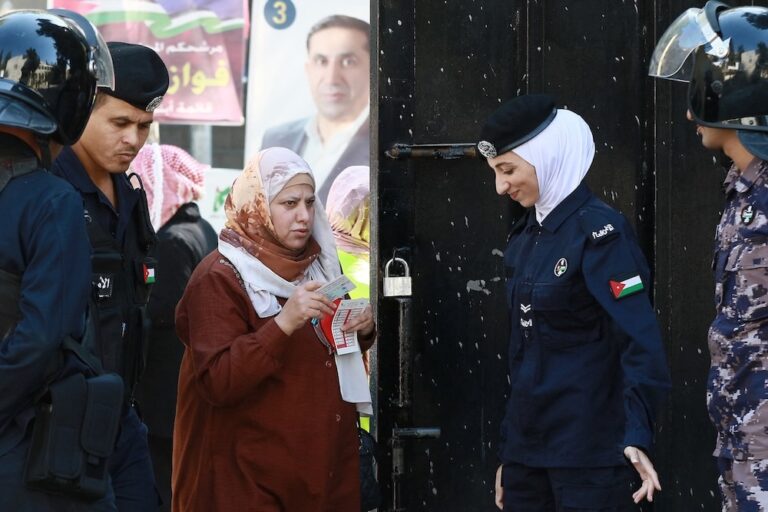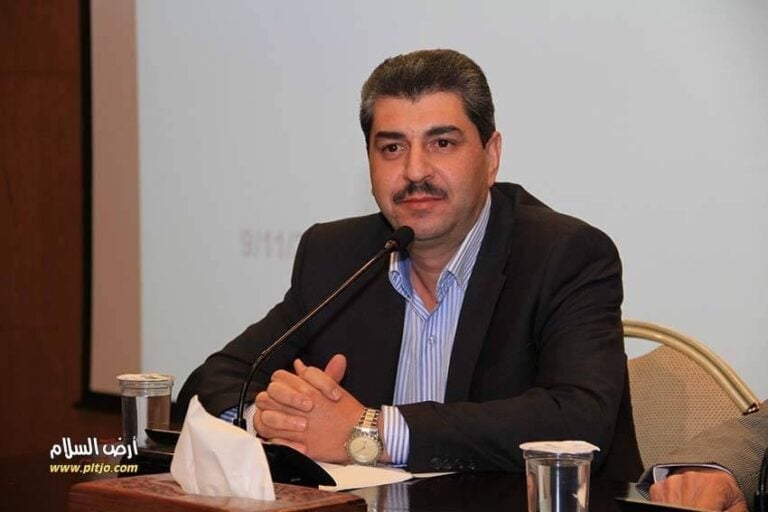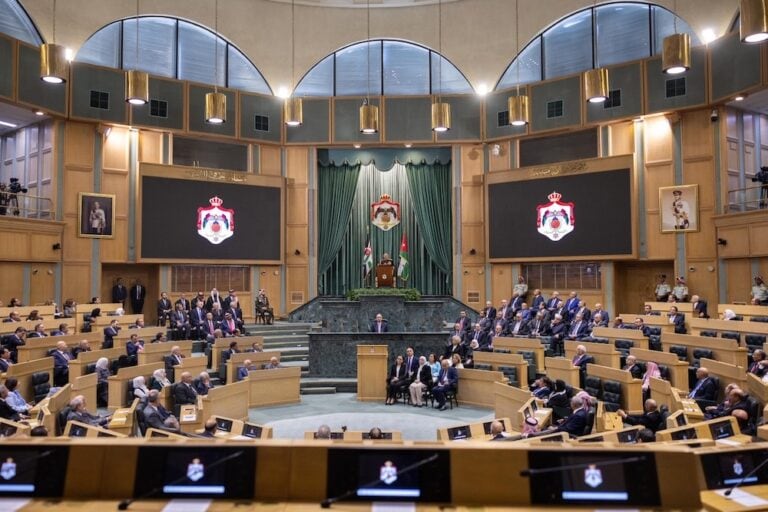(CPJ/IFEX) – On the occasion of King Husseinâs meeting with President Clinton on 19 March 1998, CPJ expresses its deep concern about recent cases of government interference with independent journalism in Jordan, which violate international standards for a free press. CPJ is disturbed by the authorities’ arrest and criminal prosecution of several journalists in response […]
(CPJ/IFEX) – On the occasion of King Husseinâs meeting with President
Clinton on 19 March 1998, CPJ expresses its deep concern about recent cases
of government interference with independent journalism in Jordan, which
violate international standards for a free press.
CPJ is disturbed by the authorities’ arrest and criminal prosecution of
several journalists in response to their criticism of public officials and
commentary on sensitive political issues. CPJ has written previously to
Jordanian government officials stating its position that members of the
press should never face arrest or criminal prosecution because of material
they publish. The organization is concerned that the threat of detention and
criminal action inhibits the ability of the press to work freely. Recent
cases documented by CPJ include:
*Raja Talab, Riad Hroub, Riham Farra, and Abdel Hadi Raji Majalli, “Shihan.”
On 16 March 1998, the Court of First Instance convicted Talab,
editor-in-chief of the weekly “Shihan”; Hroub, the paper’s publisher; Farra,
a columnist; and Majalli, a former editor, of defaming parliamentary deputy
Muhammad Ra’fat. The four journalists were each sentenced to six months in
prison and a fine of 1,000 JD. The basis for the charge against them was an
article and a cartoon published in “Shihan” in late 1997, which criticized
Ra’fat for a visit he made to the Israeli Knesset. All four have appealed
the court’s decision.
“Bassam Badareen, “Al-Quds al-Arabi.”
On or about 7 March 1998, Badareen, the Amman correspondent for the
London-based daily “Al-Quds al-Arabi” was formally charged with “distorting
Jordan’s image abroad”, harming state relations with a friendly country, and
offending the state charges criminalized under the penal code. The case
against Badareen stems from a series of articles he wrote for “Al-Quds
al-Arabi” in late 1997, dealing with such topics as tensions between the
government and the Islamist opposition following its boycott of last
November’s parliamentary elections, and criticism of the Arab-Israeli peace
process. Badareen faces up to three years in prison if convicted of the
charges.
*Abdel Hadi Raji Majalli, “Abed Rabbo.”
On 2 March 1998, security agents detained Majalli, editor-in-chief of the
weekly “Abed Rabbo”, at his home, in response to a front-page photograph
published in “Abed Rabbo”, which satirized Prime Minister Abdel Salam
Majalli. Abdel Hadi Raji Majalli was held for five days without charge at
General Intelligence in Amman. To the knowledge of CPJ, no formal charges
have been brought against him.
*Omar Qoulab and Sami Zubaidi, “Al-Bilad.”
On 2 March 1998, security agents detained Qoulab and Zubaidi, editors for
“Al-Bilad”, at the paper’s Amman office in response to an article published
in the newspaper, which discussed former Prime Minister Abdel Karim
Kabariti’s alleged links to a Jordanian bank, sources at the newspaper told
CPJ. Both men reportedly were held without charge by General Intelligence in
Amman for five days. It is unclear whether formal charges have been brought
against them.
In addition to the detention and prosecution of journalists, CPJ is
disturbed by the Press and Publications Department’s (PPD) ongoing
censorship of foreign publications entering Jordan. Since last year, when
the government of Abdel Salam Majalli reintroduced this practice, CPJ has
documented numerous instances of distribution bans of foreign newspapers
such as the London-based dailies “Al-Quds al-Arabi” and “Al-Hayat” for what
has been perceived as their unfavorable coverage of Jordanian affairs.
“Al-Quds al-Arabi” estimates that eight issues of the newspaper have been
banned since 1 February 1998. In October 1997, CPJ documented the
confiscation of 15 issues of the newspaper in 18 days.
Finally, CPJ would like to express its support for the 26 January 1998
decision by the High Court of Justice to annul amendments to the Press and
Publications Law enacted in May 1997. CPJ views the court’s ruling that the
press amendments were unconstitutional as a positive development for press
freedom in Jordan. On several occasions in 1997, CPJ voiced strong
opposition to the amendments, which prescribed sweeping restrictions on the
press and which led in November 1997 to the closure of 12 independent weekly
newspapers known for their critical coverage of state policy. While CPJ is
encouraged by the reappearance of many of the newspapers that were forced to
close last year, the organization is concerned about the prospect of the
government introducing similar amendments in parliament because the High
Court ruling faulted the means of enactment, and not the substance of the
amendments. These concerns are heightened by statements made last month by
Bilal al-Tal, Director of the Press and Publications Department who noted in
an interview with the “Jordan Times” that: “Nothing should prevent the
government from introducing such a law [a new press law], especially since
the recent decision of the High Court did not cancel or discuss the essence
of the new press
regulations.”
CPJ views the arrest and prosecution of journalists and the censorship of
newspapers as clear violations of the right to “seek, receive, and impart
information and ideas through any media and regardless of frontiers,” as
guaranteed by Article 19 of the Universal
Declaration of Human Rights.
Recommended Action
Send appeals to authorities:
safeguarding
press freedoms in Jordan and bringing Jordan’s practices in accordance with
international standards for a free press:
1. Cease all criminal prosecutions of journalists in response to their
published work. Specifically, end the prosecution of journalists under
statutes of the penal code, which contain a variety of ill-defined
provisions and which prescribe penalties of imprisonment;
2. Halt the arrest and detention of journalists in response to their
professional duties;
3. Ensure that the Press and Publications Department end its censorship of
foreign
publications;
4. Assume a leadership role in opposing any new amendments to the Press and
Publications Law (1993) that restrict the right of journalists to “seek,
receive, and impart information and ideas through any media and regardless
of frontiers”, as guaranteed under international law. Specifically, asking
that they ensure that any future amendments preserve media pluralism,
including the dissemination of a diversity of views, even if these views are
opposed to, or critical of, prevailing state policies; and
5. Repeal articles of the Press and Publications Law that directly threaten
press freedom and contravene international human rights standards for a free
press. These include Article 9 and Article 40, which prescribe ill-defined
prohibitions on the content of journalists’ writing and outline publications
offenses that are punishable by law.
Appeals To
His Majesty King Hussein Ibn Talal
c/o of His Excellency Ambassador Marwan Muasher
Embassy of the Hashemite Kingdom of Jordan
3504 International Drive, NW
Washington, DC 20008
Fax: +202 966 3110
Please copy appeals to the source if possible.


